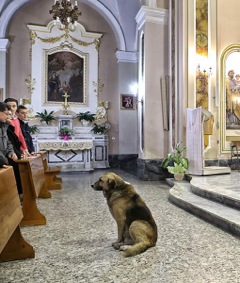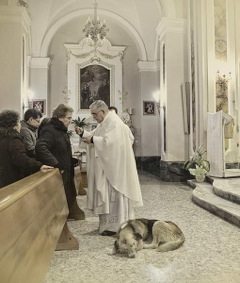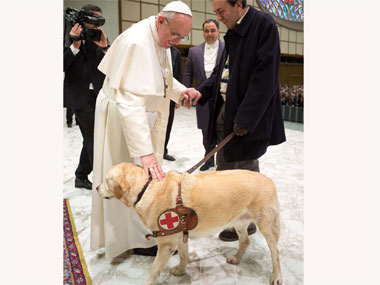From BuzzFeed:
Every now and then I go to a country Episcopal church in LaGrange, Tn. Sometimes on my way to ride my horse around the corner, other times just to soak in the beauty of the sanctuary with no given destination. It’s a very small church family; I love the warmth of the church and the congregation. But what I love best is the elegant Rhodesian Ridgeback that perches contemplatively on one of the back pews with his human parents. This dog never moves an inch nor does he ever bark. He just lies in quiet meditation as if he were reflecting upon the hymns and sermon. Or maybe he’s just simply resting to the vibrant beat of “Onward Christian Soldiers”?
So, what do you think, animal lovers? Is this dog more connected to spirituality than he is letting on? Do animals gain a sense of peace in these holy places?
Here is a heartwarming story published by AFP, January 16, 2013 that really has to make you wonder.
ROME – Since his owner died two months ago, Tommy the dog has not missed a single mass in the small church in southern Italy where his mistress’s funeral was held, Italian media said Wednesday.
When the bells of the Santa Maria Assunta church begin to toll each afternoon in San Donaci near Brindisi , the 12-year-old German Shepherd sets off from the village to get himself a front row seat next to the altar, Il Messaggero newspaper said.
His owner, who was known in local dialect as “Maria TU lu campu”— “Maria of the fields” — had lived alone with Tommy and three other rescue dogs, who used to follow her faithfully on her daily rounds and have now been adopted by the village.
After following his mistress’s coffin up to the church on the day of her funeral, Tommy has returned daily, sitting quietly throughout masses, baptisms and funerals, according to local priest Donato Panna, who now wouldn’t do without him.
AND what about this?
From FP:
When visually impaired radio journalist Alessandro Forlani entered the Vatican’s vast Paul VI audience hall on Saturday little did he expect that along with his guide dog Asià, he stood a chance to meet newly elected Pope Francis.
But to his surprise, while he was sitting along with his media colleagues in the Paul VI audience hall a Swiss Guard informed him that the Pope had spotted him and his dog and would like to meet them.
“They said that Pope Francis had asked to meet me. He had seen Asià and wanted to see both of us,” Forlani wrote on his Facebook page.Asià walked on the stage, briefly sniffed the Pope’s shoes and then waited patiently as Forlani talked to the pontiff.
“I asked for a blessing for my wife and daughter at home,” Forlani said. Pope Francis then leaned down and patted Asià, saying: “and a special blessing for your dog too.”
Talking about animal’s souls is a topic for another day. But wondering what these animals must be sensing, seeing, and feeling is an endless quest for me.









